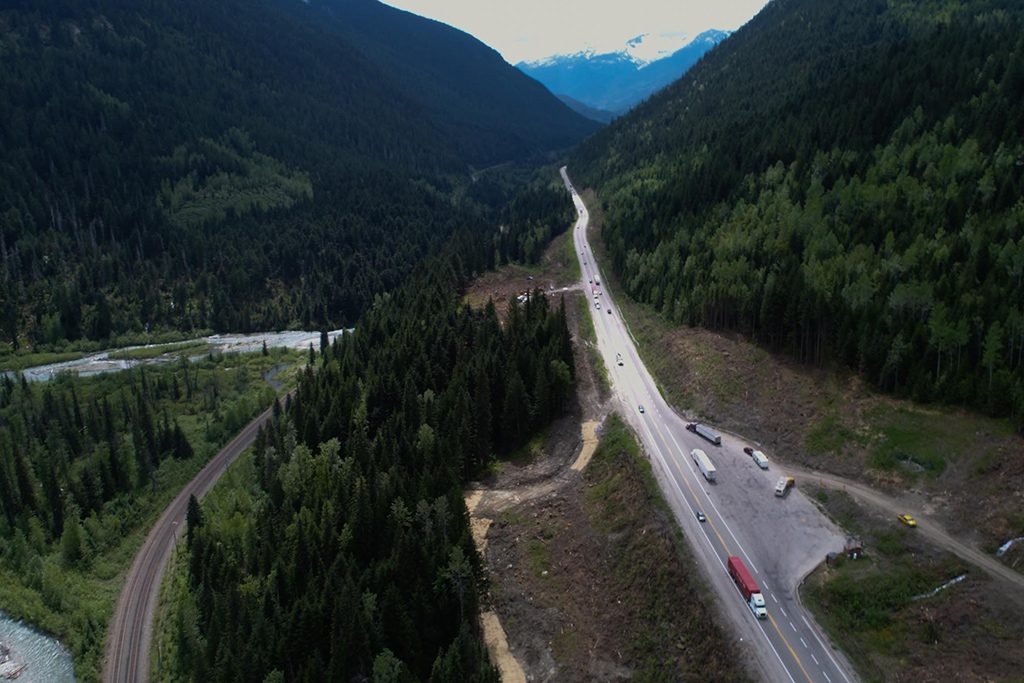The province of B.C. announced that its Illecillewaet four-laning project will cost $22.3 million more due to rising costs.
According to government officials the increase is due to “escalating costs of materials, labour and the complexity of the work required.”
The Independent Contractors and Businesses Association blamed the province’s new community benefits agreement (CBA) which is being used for the first time on the project.
“The NDP’s sweetheart deal with their building trade union allies has driven the cost of this project up by a third, and they’re not even in the ground yet,” said Chris Gardner, ICBA president, in a statement. “It’s no surprise – there were far fewer bidders than expected as many roadbuilding companies are avoiding the NDP’s forced labour model. It’s a backroom deal of the worst kind.”
The CBA framework establishes the B.C. Infrastructure Benefits Board (BCIB), which will manage employment on major government projects. Under the framework, anyone can bid on a project, but workers must join the Allied Infrastructure and Related Construction Council of BC, a conglomerate of building trades unions, within 30 days of starting work on a CBA project. The province has argued the plan will source the skilled labour needed for major projects and increase the number of apprentices on sites.
The Vancouver Regional Construction Association (VRCA) criticized the government’s project budgeting and warned that if it cannot budget with predictable and known costs in mind, the taxpayers will suffer. The association noted that government documents show there were four bids to do the Illecillewaet work, ranging from $51.5 million to $58.7 million, suggesting the industry was aware of the construction costs they would face.
“If the provincial government is unable to budget accurately, Premier John Horgan will face four options: build fewer projects; reduce the size and scope of the projects; increase taxes to pay for the projects; or incur debt to build the projects,” said Fiona Famulak, VRCA president. “In all cases, it will be B.C.’s taxpayers who pay the price by not getting the projects they need, or by seeing their tax bill increase.”
Famulak explained that it is impossible to say at this point how much of the cost increase is due to the CBA but noted government officials did anticipate the program rollout could increase costs from four to seven per cent.
However, she said that while increased taxes, international and inter-provincial trade disputes, the skilled labour shortage and the rising cost of supplies and materials have made it more expensive to build in the province, many of these costs should have been predictable.
“Simply put, the government’s budget fell behind and that’s not good enough,” said Famulak.
Tom Sigurdson, executive director of the BC Building Trades, pushed back, explaining that critics must look at other major recent projects for context. He cited the Evergreen Line budget which increased by 43 per cent, the Port Mann Bridge was built for a billion dollars more than anticipated and others.
Sigurdson added that those assigning blame to the CBA are also ignoring the other forces impacting costs.
“This is the most volatile I have ever seen the construction market, there are lots of projects, volatile international markets, you don’t know from one day to the next what commodity prices and materials are going to be,” Sigurdson said.
He also argued that previous efforts to increase apprentices, a major component of the CBA, have failed miserably.
The Site C Dam, undertaken under Liberal Premier Christy Clark, increased to over $10 billion in cost from its original budget of $8.3 billion and the latest employment statistics show less than four per cent of current workers are apprentices.
“We are going to be scapegoated, we are going to be the whipping post, it’s unfortunate, but eventually two things will happen,” said Sigurdson. “The truth will show that this is not just due to labour costs and the real benefit is that more people are completing their apprenticeships. We are going to not only build the project, we are going to be building the skills sets of British Columbians who are going to remain in the construction industry and help build the economy.”
The Ministry of Transportation and Infrastructure explained that the higher costs for the project are driven by factors that are impacting construction projects elsewhere in B.C. regardless whether they include a CBA. It also is a particularly difficult project.
“Four-laning projects are complex in nature due to challenging terrain, the need for appropriate geotechnical assessments, difficult traffic management and appropriate consultation with local communities and impacted First Nations,” said a ministry spokesperson. “Projects are always assessed on a case by case basis, with every effort made to contain costs.”
The spokesperson said the hot construction market is adding pressures to projects, including the escalating costs of materials and labour. The ministry added that labour pricing factors include a shortage of skilled trades, a widespread challenge throughout the construction industry, that it believes the CBA will help address in the long term.
The ministry said that cost increases are not tied to the CBA and noted that last month a non-CBA highway project was deferred after its costs increased by 100 per cent and five non-CBA school projects have seen notable increases due to material costs.
Work is expected to start on the highway project in June, with completion in spring 2022. The project includes two kilometres of highway widening, expanding the existing brake-check area to accommodate up to 15 trucks and adding acceleration and deceleration lanes for commercial vehicles entering or leaving the brake check. Emil Anderson Construction has been awarded the contract.











Recent Comments
comments for this post are closed